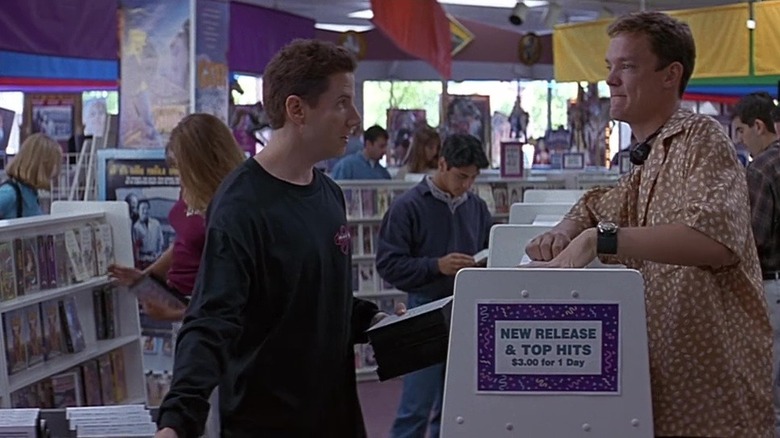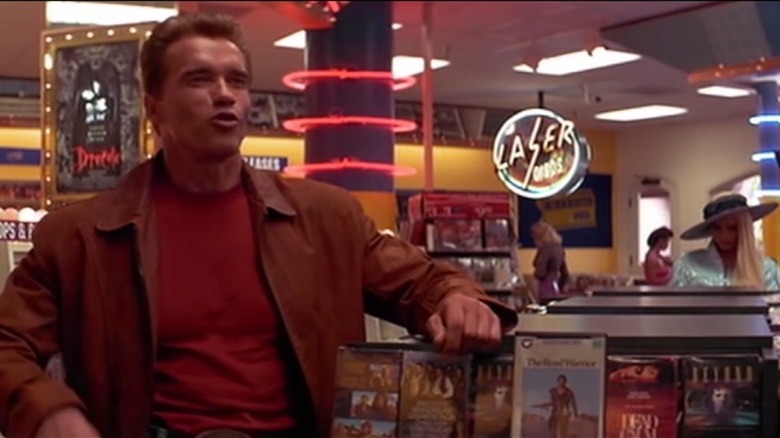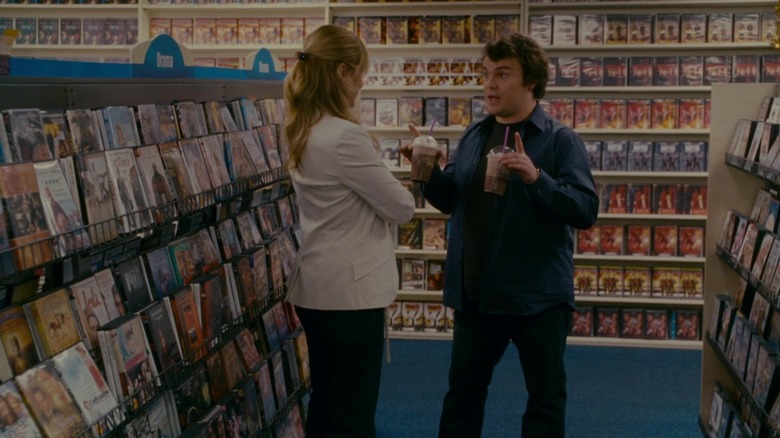Best Buy Is Going To Stop Selling Physical Media, And That's Profoundly Bad News For Movie Fans
It may sound silly to say, but a retail store can have a profound effect on you, one that you may not realize until much later. I've had several such stores act as impactful hubs throughout my life, destinations where I could access the material that enlightened and enriched me as I grew up — everything from comic book stores to regular old bookstores to record shops.
Of course, stores that sold physical media for cinema — which comprises DVDs, Blu-rays, and now 4K UHD discs — were and are my most prized places. One of these stores was the Best Buy branch on Lohr Road in my old hometown of Ann Arbor, Michigan. It was perfectly located less than a mile away from my high school, the mall, and one of my first jobs (a clerk at a Hollywood Video across the street). As the franchise's namesake suggests, Best Buy became a destination for me thanks to its competitive (read: affordable) pricing of physical media, allowing me to build a film library that's still growing to this day. How important was this store to me? My Best Buy membership (which I began back in 2003 when the "Reward Zone" loyalty program launched) is still linked to my old Michigan phone number.
However, just like Robert Frost said, nothing gold can stay. Bill Hunt at The Digital Bits reports that Best Buy aims to stop selling physical media completely (in both their brick-and-mortar stores and online) as soon as the beginning of 2024. While this news has yet to be officially announced by the company (Editor's note: since this article was written, Best Buy has confirmed the news), it's something that feels very likely to be true, reflecting the industry's frustratingly narrow view when it comes to digital over physical media. It's a profound loss for movie fans, to be sure — but it doesn't have to be the death knell for physical media, either.
When Best Buy really was the Best Buy
Let's not put on our rose-colored nostalgia glasses for too long, of course — this is the diminishing of a corporate big-box chain and not a mom-and-pop store, after all. What we're really mourning isn't the latest in a long series of bone-headed business decisions influenced by the scourge of venture capitalist business practices (though such things are still worrying), but rather the loss of easy, affordable — and most importantly— in-person, on-hands access to physical media.
As physical media slowly slides back into becoming a niche market for collectors, there will be those who claim that it's not all that massive a change. That's because the first-ever physical media for movies — formats like Betamax, VHS, and Laserdisc — were pretty pricey when they hit the marketplace. Just take a gander at most catalogs from the late '70s and '80s and you'll see movies going for around $40 a pop, and some special edition releases selling in the $100 range. While those prices are more or less what today's physical media goes for, remember that they haven't been adjusted for inflation, meaning there's room for today's prices to inch further up.
Part of the reason they haven't yet is thanks to Best Buy, who instituted a price matching policy early in its operation, supposedly to back up the name of their business. As such, big competitors like Target, Costco, and especially Amazon have found themselves matching Best Buy's pricing points for physical media, which have typically been fairly low. When DVD was big during physical media's heyday (roughly between 1997-2012), Best Buy was a fantastic place to start collecting, as they would offer movies for around $10 next to such items as the "Lord of the Rings" Extended Edition box sets at similarly affordable prices. With Best Buy getting out of the physical media game, it means these other outlets may no longer have a reason to keep their prices low, and they could let things creep up toward the dreaded Manufacturers Suggested Retail Price (MSRP).
Hands on versus hands off
Our society is now irrevocably entrenched in the habit of shopping online, and it's no wonder why, as it provides a level of convenience in both the physical aspect as well as personal effort: why drive around from store to store looking for a particular item when you can just use the search bar?
Yet what this practice has caused us to lose is the potential for discovery. Sure, algorithms can try all they like with their "Customers Also Bought" recommendations, but they're no substitute for surveying fully stocked shelves of items, presenting the shopper's eye with a lot more information than a potential click of a mouse could. When Best Buy's movie section was at its peak, it would be a pleasure just to browse their shelves, similar to the way it was with video rental stores. Incidentally, back when I worked at that Hollywood Video, I'd often turn customers away from purchasing our "Previously Viewed" DVDs and send them to Best Buy, because not only could they be found there for a similar price, but they wouldn't run the risk of the disc being scratched up from being rented numerous times.
As physical media sales within the general public have dwindled, Best Buy's once mighty movie shelves have adopted a sad, barren look — not from things being sold out, but from stock not being provided, of course. Yet the store has continued to sell an impressive variety of films, presenting not just studio-produced products but releases from niche labels like Shout/Scream Factory. Even now, you could walk into a Best Buy and discover a release that maybe you hadn't heard about, or a film new to you. Soon, those discoveries will no longer happen.
The loss of exclusives?
When this news first broke on social media, some folks like myself were highly skeptical about it for one main reason: until now, Best Buy has seemed rather bullish on keeping up its physical media branch. Although some major downsizing has occurred in their brick-and-mortar stores (resulting in the movie sections shrinking or, in some cases, vanishing altogether), the chain has seemingly increased its offering of exclusive releases.
This is yet another long-standing tradition Best Buy has with physical media — I fondly remember perusing the store's circular that would arrive with the Sunday newspaper (remember those?) back in the day, for without the help of message boards, it'd be the only way to know if Best Buy would be selling an exclusive edition of a new release. In the past, these exclusives would take the form of entire bonus discs with additional special features. These days, they're all about Steelbooks, the sturdier-packaged 4K/Blu-Ray case that typically features unique artwork. While these exclusives don't involve on-disc content and are largely cosmetic, they appeal to the collector who enjoys displaying their wares, as well as those who simply like the things they own to have an attractive aesthetic. One of their most recent exclusive releases is a Steelbook for "Prey" (itself a movie formerly relegated to a streaming service that fans demanded be released physically), which as of this writing is still sold out.
If Best Buy is to discontinue these exclusive Steelbook releases (severing ties with major studios like Disney, Universal, Warner Bros. Discovery, and Lionsgate in the process), it's unclear what will happen to them. Some (like Bill Hunt) are speculating they'll simply become Amazon exclusives, and other retail outlets still do their own occasional exclusive releases. For those of us who believe Best Buy may end up having a change of heart and at least continue selling movies online, these Steelbooks are Exhibit A.
Physical media is not dead, all hope is not lost
If Best Buy commits to its decision to nix physical media from its business, it means that thousands of longtime customers (not to mention potential new ones) will lose easy, direct, physical access to movie discs. Coming on the heels of Netflix deciding to discontinue their DVD-by-mail rental service along with numerous op-eds on the state of physical media, it may seem like the format is finally shuffling off its mortal coil.
Yet reports of its death are, in my opinion, greatly exaggerated. While the casual viewer may be perfectly satisfied by streaming and other digital options, the major shifts happening in that world could push people back to physical media, especially those disgruntled by streaming services deleting entire swathes of films and television with little notice. Meanwhile, the still-large number of folks who are committed to physical media have no intention of stopping anytime soon, especially as there now exist several generations weaned on the format, its superior audio-visual capabilities, and its capacity for enlightening extra content (not to mention the fact that a single purchase and low maintenance means you get to enjoy a film whenever you like for a very, very long time).
For those still interested in continuing to buy discs, there exist a good number of online shops you can patronize. DiabolikDVD (which features some of the best customer service you're likely to experience), OrbitDVD, and Grindhouse Video are great places to start, especially as they're run by real people and not major corporations, meaning that the element of personal curation is still a factor in what they stock. For genre fans, the option to buy from boutique distributors like Criterion, Arrow, Shout!, Severin, Radiance, Umbrella, Vinegar Syndrome, and countless others directly is a great way to support those companies' efforts.
There's no question that Best Buy's decision marks the end of an era for many of us, and their cutting off physical media likely means that going out on an in-person shopping excursion will no longer include the purchase of a new 4K or Blu. That said, their choice doesn't have to be your choice; if you, like me, still adore physical media, you don't have to give up on it.
As always, don't let corporate America tell you what to do!




